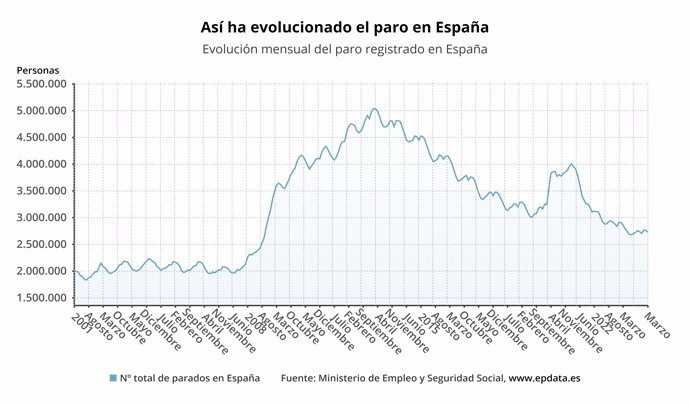Services and women led the decrease in unemployment in a month in which permanent hiring fell 18% and temporary hiring reached its lowest levels since 1997
MADRID, 2 Abr. (EUROPA PRESS) -
The number of unemployed people registered in the offices of public employment services fell by 33,405 people in March compared to the previous month, which represents a decrease of 1.2% in percentage terms, according to data published this Tuesday by the Ministry of Labor and Social Economy.
After the decline in March, driven mainly by the services sector and the fall in female unemployment, the total number of unemployed stood at 2,727,003 unemployed, the lowest level for a month of March since 2008, the Ministry has stressed.
The drop in unemployment in March of this year is lower than the decline experienced by unemployment in the same month of 2023, when it decreased by 48,755 people, but it is above the decrease recorded in 2022 (-2,921 unemployed), when the war broke out in Ukraine .
Since the beginning of the comparable historical series in 1996, unemployment has fallen in March on 24 occasions and has risen on 5 occasions. The largest increase in this month, of 302,365 unemployed, was recorded in 2020, at the beginning of the pandemic, while The greatest decrease was in 2002, with 66,804 fewer unemployed.
In seasonally adjusted terms, registered unemployment increased in the third month of 2024 by 11,900 people.
In the last year, unemployment accumulated a decrease of 135,257 unemployed, which represents 4.7% less, with a decline in female unemployment of 85,766 women (-5%) and a fall in male unemployment of 49,491 men (-4. 3%).
Unemployment fell in March in all economic sectors, except in the group without previous employment, where it increased by 1,779 people (0.7%). The largest monthly decrease was recorded in services, with 31,294 fewer unemployed (-1.6%), followed by industry, which lost 2,055 unemployed (-0.9%); agriculture, where unemployment decreased by 1,502 people (-1.5%), and construction, with 333 fewer unemployed (-0.1%).
Unemployment fell in March in both sexes, although somewhat more among women. Specifically, female unemployment fell by 23,009 women compared to the previous month (-1.4%), compared to a drop in male unemployment of 10,396 men (-0.9%).
Thus, at the end of the third month of 2024, the total number of unemployed women stood at 1,632,557 women, while the number of unemployed men totaled 1,094,446.
By age, unemployment among young people under 25 years of age decreased by 1.3% in March, with 2,748 fewer unemployed than at the end of February, while unemployment among people aged 25 and over fell by 30,657 unemployed (-1 ,2%).
After the decrease in March, the total number of unemployed people under 25 years of age fell to a total of 205,007 unemployed, its lowest figure in a month of March in the historical series.
Registered unemployment fell in March in 15 autonomous communities and rose in the Basque Country and Madrid, with 926 and 701 more unemployed, respectively. The largest monthly decreases, on the other hand, were recorded in Andalusia (-11,374 unemployed), the Canary Islands (-4,686 unemployed) and the Valencian Community (-3,998).
As for the provinces, unemployment fell in 46 of them, led by Málaga (-3,095 unemployed), Santa Cruz de Tenerife (-2,456) and Seville (-2,289), and rose in six, mainly in Madrid (701 unemployed). , Guipúzcoa (534 unemployed) and Vizcaya (427).
Registered unemployment among foreigners fell by 4,807 unemployed compared to the previous month (-1.3%), bringing the total number of unemployed immigrants to 366,441, which represents 6,474 fewer unemployed than a year before (-1.7%). .
Despite the celebration of Holy Week, which last year was celebrated in April, in March of this year 1,123,488 contracts were registered, 14.6% less than in the same month of 2023.
Of all of them, 504,893 were permanent contracts, a figure 18% lower than a year before. In total, 44.94% of the contracts made in March were indefinite, a percentage slightly lower than that registered in February, when the proportion of permanent contracts was 46%.
Among the permanent contracts, 222,515 full-time contracts were made in March, 21.7% less than in the same month last year; 158,271 permanent-discontinuous contracts (-12.5% year-on-year) and 124,107 indefinite part-time contracts (-17.6%).
Of all the contracts signed in March, 618,595 were temporary contracts, 11.5% less than in the same month of 2023 and the lowest number since 1997. In total, these contracts represented 55.06% of the total hiring carried out in the third month of the year.
In the first three months of the year, 3.4 million contracts have been made, 4.3% less than in the same period of 2023. Of these, 1.53 million have been permanent contracts, 6.3% less, while that 1.91 million have been temporary, which is 2.5% less than in the same period last year.
The Ministry has also reported that spending on unemployment benefits reached 2,027.1 million euros in February 2024 (latest data available), 3.8% more than in the same month of 2023.
The average monthly expenditure per beneficiary, not including the agricultural subsidy of Andalusia and Extremadura, amounted to 1,092 euros in the month of February, 2% more.
The average gross amount of the contributory benefit received per beneficiary was 984.6 euros last February, which represents an increase of 26 euros over the same month of the previous year (2.4%).
The total number of beneficiaries of unemployment benefits stood at 1,893,595 people at the end of February, a figure 1.6% higher than that of February 2023.
The coverage rate, which a year earlier was 68.11%, rose in February 2024 to 73.19%, the highest value for a month of February since 2011, as highlighted by Labor.
Benefit data is always a month behind unemployment data, so this Tuesday the Ministry published the unemployment figures for March and the benefit statistics for February.
The Department led by Yolanda Díaz has also highlighted that in 2023 the unemployment budget surplus increased to 5,927 million euros thanks to the recovery of employment and greater collection due to the increase in salaries.













